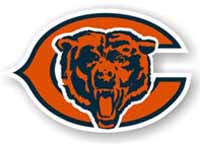
The NFL regular season has ended. Teams are starting their annual fire sales on coaches and coordinators. Some of the early casualties include Patriots' head coach Bill Belichick, Chargers' head coach Brandon Staley, Washington Commanders' head coach Ron Rivera, Chicago Bears' offensive coordinator Luke Getsy, and others. That's on top of mid-season firings of Raiders' head coach Josh McDaniels and Carolina Panthers' head coach Frank Reich. During the second half of the season, speculation about which coaches would get fired was accompanied by fans arguing over whether these bad teams were "tanking" the season (or should tank the season) to improve their draft picks. The Bears were one of the most talked-about teams in this regard.
I don't pretend to know what goes on behind closed doors in NFL front offices, and no NFL front office has ever (to my knowledge) actually come out and said "we're deliberately tanking this season", so whether or not a team might be tanking is pure speculation. But if you ask me, no professional sports team should ever deliberately tank a season! And this goes double for any team that is operating with a 1st or 2nd year coaching staff or general manager, as is the case for the 2022 and 2023 Chicago Bears.
Many fans speculated (and even wanted) that the Bears would tank in 2022. And after a 1-5 start to the 2023 season, some fans even began to think the Bears were tanking this season too. Reddit was awash with posts insisting that the Bears' should tank in order to get the top 2 picks in the 2024 NFL draft (the Bears own the Panther's first round pick, in addition to their own pick). This would allow the Bears to cut Justin Fields and draft Caleb Williams, as well as get some other top-tier elite talent.
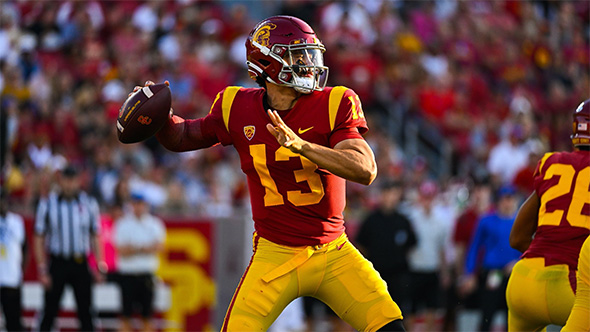 Photo credit: John McGillen, Photography LLC.
Photo credit: John McGillen, Photography LLC.
Many fans expect the Bears to cut or trade Justin Fields in order to draft Caleb Williams.
Personally, I am willing to go on the record as saying that I do not agree with this popular consensus that the Bears should draft Caleb Williams. I am still on the fence about Justin Fields' potential, and would like to see him stay with the team. I would prefer that the Bears trade down to get more draft capital, and focus on taking an elite receiver (Marvin Harrison Jr.), offensive lineman, pass rusher, and/or cornerback. But my feelings on the Bears' specific 2024 strategy is neither here nor there. The main point is that regardless of the Bears' plans with Justin Fields (or any teams' plans with any roster), no team should ever deliberately tank a season.
The thing about tanking is that "tanking" is practically indistinguishable from actually sucking.
Are they tanking? Or just bad?
First and foremost, I want to clarify what I mean by "tanking". Teams really do "tank", and actually do have good reasons for doing so. In real life, "tanking" usually involves front office personnel decisions. A team might trade away good or elite veteran players to acquire draft picks or younger (and cheaper) developmental players. If they don't trade away such players, they might start benching veteran players in favor of younger developmental players already on their roster. These are things that teams might do, as a matter of routine, if they feel the season is already a bust.
But there is a common misconception among casual sports fans that a general manager or owner might instruct the coaching staff to deliberately call a bad game in order to try to lose. Further, fans will argue about whether a team should deliberately throw games in order to improve their draft position. This is the kind of "tanking" that I am referring to in this blog post. I honestly do not believe that this happens in any professional sport. And if it does happen, then it shouldn't be happening.
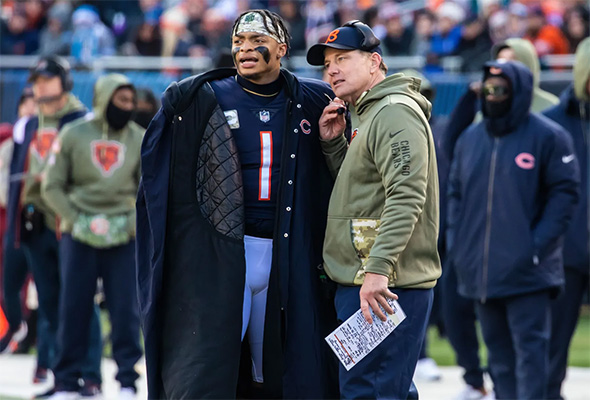 Photo credit: Ashlee Rezin, Sun-Times
Photo credit: Ashlee Rezin, Sun-Times
How can we know if Eberflus is a great coach who is just tanking, or if he's just a bad coach?
From a management perspective, if you give a coaching staff leeway to deliberately throw games in order to "tank" a season and get better draft picks, then there is no way to actually gauge how good the coaching staff or current roster actually is. This makes it difficult to determine which areas of the team actually need to be improved during the offseason, and it makes it impossible to properly evaluate whether the current coaching staff is actually competent enough to be trusted with a more competitive roster, and whether they should be retained past the tanked season.
The only situation in which I could see tanking being a reasonable thing to do would be a situation in which a coaching staff is very well-established. If that coaching staff has seen a lot of turn-over at the roster, especially at key positions like quarterback, and the management is reasonably confident that the coaching staff is good, then maybe they can be justified in letting that staff tank a season in order to draft a particular player that the management really wants. Mike Tomlin, for instance, has never had a losing record with the Steelers in almost 20 years of coaching the team. So if the Steelers were having a bad start to the year, and decided they wanted to tank in order to draft a supposed "generational" talent, I could kind of get behind that. But they didn't, and they ended up turning their 2023 season around and making the playoffs...
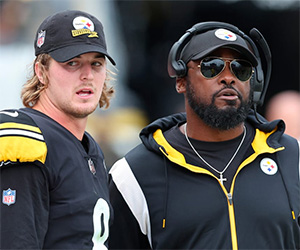 Photo credit: Ashlee Rezin, Sun-Times
Photo credit: Ashlee Rezin, Sun-Times
Mike Tomlin is an established coach who can afford
to tank a season if management let him.
But the Bears aren't the Steelers, and Matt Eberflus is not Mike Tomlin. Eberflus currently has a 10-24 record as the Bears' head coach over 2 seasons.
Was Eberflus still "tanking" when the Bears' started 2023 with a 2-7 record? Did he finally start coaching for "super-realsies" in the second half of 2023 when the Bears won 5 of 8 games? That 5-3 record over half a season could be extrapolated to and expectation of 10 1/2 wins over a full season. 10 1/2 wins is pretty good, and would be good enough for at least a wildcard berth in most seasons (if not a division championship). Is 10 1/2 wins a more reasonable expectation for the Bears' future success under Eberflus?
Or did the Bears over-achieve in the 2nd half of 2023 against a parade of weak opponents? There were only 3 playoff teams in the bunch, and the Bears only beat 1 of those. The Bears only won 3 games in 2022, and were on pace to only win 4 in 2023 until the late season surge. Is 3 or 4 wins closer to the expectation for Eberflus' future?
We as fans don't know, because we can't tell if those poor performances are actually representative of Eberflus' best efforts at coaching the team to a win, or if he was deliberately holding back.
Stunting future growth
And this brings up the next big problem with deliberately tanking: tanking potentially stunts the development of the players that the team plans on keeping.
If the coaches are holding back in their game-planning and coaching because they are trying to loose, then the players probably aren't receiving the coaching and practice that they need to fully develop their talents and reach their potential. At worst, the coaching may even be teaching the players bad habits that will carry into their performance after the team stops trying to tank and starts trying to win.
Again, looking at the Bears' 2022 and 2023 seasons, and assuming that the Bears did actually tank 2022 on purpose, then going into the 2023 season simply saying "OK, let's try actually winning for super-realsies this time" clearly did not work. It failed to prepare the team for success in the first half of 2023. They won 2 of the first 9 games, including a blown lead to the Broncos, who looked like the other worst team in the NFL at the time.
Did deliberately bad coaching in 2022 stunt the development of young players like Justin Fields? Would he still have been making sophomoric mistakes in 2023 had the coaches been genuinely putting in their best efforts to prepare him for success in 2022? Had the Bears not tanked 2022, maybe the problems that prevented success in early 2023 would have been identified in 2022 and fixed in the 2023 off-season. Maybe the Bears would have gone into 2023 strong, already knowing how to win.
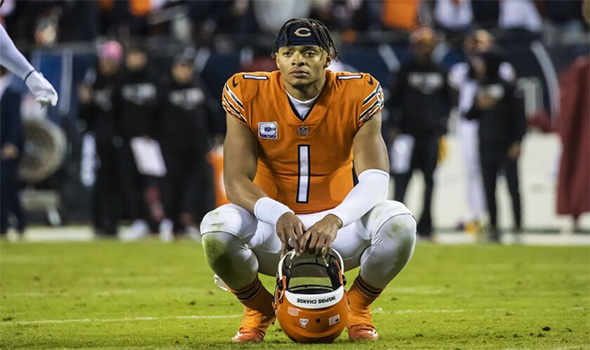 Photo credit: Ashlee Rezin, Sun-Times
Photo credit: Ashlee Rezin, Sun-Times
Was Justin Fields' development stunted by deliberately bad coaching in 2022?
Instead, it took this staff until November to finally figure out how to consistently win. The team rallied in late 2023 to an almost-respectable 7-win record, and finished 1 1/2 games out of a wildcard berth. But if they hadn't been [supposedly] holding back in 2022, and hadn't gotten off to a bad start in 2023, then could they have won 2 or 3 early games? Could the Bears have held on to beat the Broncos in week 4? Or the Chargers in week 8? Could they have played more competitively against the Buccaneers, Vikings, or Saints, and won 1 or 2 of those games? All those looked like winnable games on paper. And had the Bears won 2 of those games, they would have made the playoffs this year. And as the 2007 Giants taught us, once you're in, anything can happen.
If the Eberflus staff had instilled a winning culture and scratched and clawed to win 5 or 6 games in 2022 (instead of tanking), then would that mentality have carried over into early 2023 losses into wins? And if the Bears had gone into mid-season with 4 or 5 wins (instead of 2), could they have made a playoff run?
The players themselves also want to play wel, and they want to win. They all play in an era of free agency and 2-year contracts. Every game that they put on film is, essentially, an audition tape for every other team in the league when they are inevitably cut, traded, or simply not re-signed by their current team. No player should want to stunt their development to loose for a season, and earn a top draft pick who might turn the team around in a year or 2. Those players might not still be on the team in a year or 2 to be there for that turnaround. And if they aren't playing their best in every snap of every game (even in a lost cause of a season), then now you look bad on film, and there's going to be less interest in signing you, and any team that wants to take a chance on you will likely offer a low-ball salary.
All the coaches and players are professionals. And if they are truly professionals, then they should be going out and doing their jobs the best they possibly can every day. That is what fans buy tickets for. That is what we want and expect to see.
There are no sure-fire "generational" draft prospects
The last point that I want to make is that tanking is stupid because no draft prospect is a sure-fire slam dunk. No matter how "generational" a player might seem on draft day, they can always turn out to be a bust. For every Peyton Manning, Bruce Smith, Chuck Benarick, or John Elway that go #1 overall, there are a dozen examples like JaMarcus Russel, Aundray Bruce, Tim Couch, Courtney Brown, Ryan Leaf, Matt Leinart, Johnny Manziel, or Brian Bosworth who have #1 overall potential and end up as utter failures in the league.
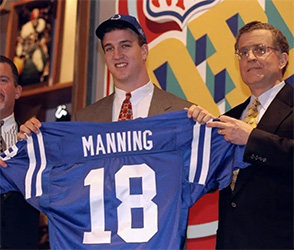 Photo credit: Ezra Shaw, Getty Images
Photo credit: Ezra Shaw, Getty Images
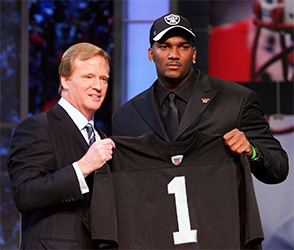 Photo credit: Reuters
Photo credit: Reuters
For every Peyton Manning, there is a Jamarcus Russel.
And it isn't necessarily the case that every draft bust simply didn't have the talent to be good. Careers can be shortened or stunted due to injury, like in the case of running back Ki-Jana Carter, who was taken first overall by the Bengals in 1995 and tore his achilles in the first preseason game. Or there can be other factors like team or league drama that impact a player's development, such as the case of defensive end Kenneth Sims, who was drafted by the Patriots in 1982, only to have the players' union go on strike and shorten his rookie season. And then there's the case of Tim Couch, who was drafted by the new Browns in the 1999 expansion draft, and was forced to play on a haphazardly-assembled team of [for lack of a better word] "rejects" from other teams. David Carr of the Texans had a similar situation.
In any case, any player can turn out to be a bust for any reason. Selling out your entire team and fanbase in order to draft a single player, and stunting the development of the rest of your roster for years to come, is a huge gamble that has rarely (if ever) worked out for a team.
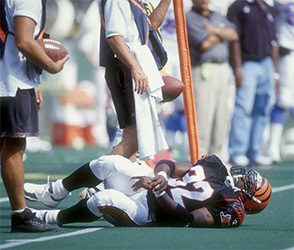 Photo credit: Mark Lyons, Allsport
Photo credit: Mark Lyons, Allsport
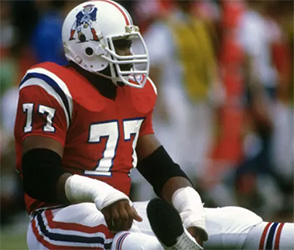 Photo credit: Focus on Sport/Getty Images
Photo credit: Focus on Sport/Getty Images
A genuinely talented top draft pick can be sidelined by injury or other circumstances.
I mean, hell, every Bears fan should know the name Gale Sayers! Sayers is a Hall of Famer, despite only playing a shortened career of 6 seasons due to multiple knee injuries. There aren't very many stories like that of Gale Sayers, but he is a perfect example of how injuries can derail the career of a generational talent. Despite his short career, he is still regarded as one of the best to ever play his position, and was inducted into the Hall of Fame. But for most players who suffer such devastating injuries, their legacy is defined by "what ifs" What if he had played longer? Would he have been an elite hall of famer?
Many people point to the 2011 Colts tanking in order to draft Andrew Luck. "Suck for Luck" was the motto of the year. But remember that the entire coaching staff was fired after that year, and many veteran players were cut or traded. That does not sound like an organization deliberately tanking one year so that they can be better next year; that sounds like an organization that sucked from top to bottom, and was overhauled from top to bottom to go along with drafting a generational talent.
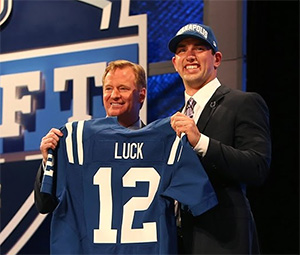 Photo credit: Jerry Lai, US Presswire
Photo credit: Jerry Lai, US Presswire
Many football fans point to the 2011 Colts as an
example of a team successfully tanking for a draft pick.
And this leads to another very important caveat about fanbases believing their team is "tanking": just because the team is really bad, it does not mean that they are deliberately tanking.
So I cringe whenever I see "fans" of a team cheering for their team to loose. Even if the season is effectively over, and a team is eliminated from the postseason, I always root for my teams to win. Maybe a lot of this comes from the fact that I've watched UNLV football my entire life, which has been a lifetime of "there's always next season". A late-season rally could be an indicator that the team is turning a corner. It could mean that the players are growing and maturing and playing better, and that better play will hopefully carry into the following year.
This was the case with the Lions in 2022, and now the 2023 Lions are the second seed in the NFC playoffs. Some still insist that the Lions are pretenders, but most people who were paying attention saw the shift in the culture of the Lions organization late in 2022 and knew that the team had hit an inflection point and was on the upswing. But that shift in culture doesn't happen if the coaches and management check out of a season due to a bad start. No team will ever develop a culture of winning if it is willing to deliberately loose just because things aren't going well.